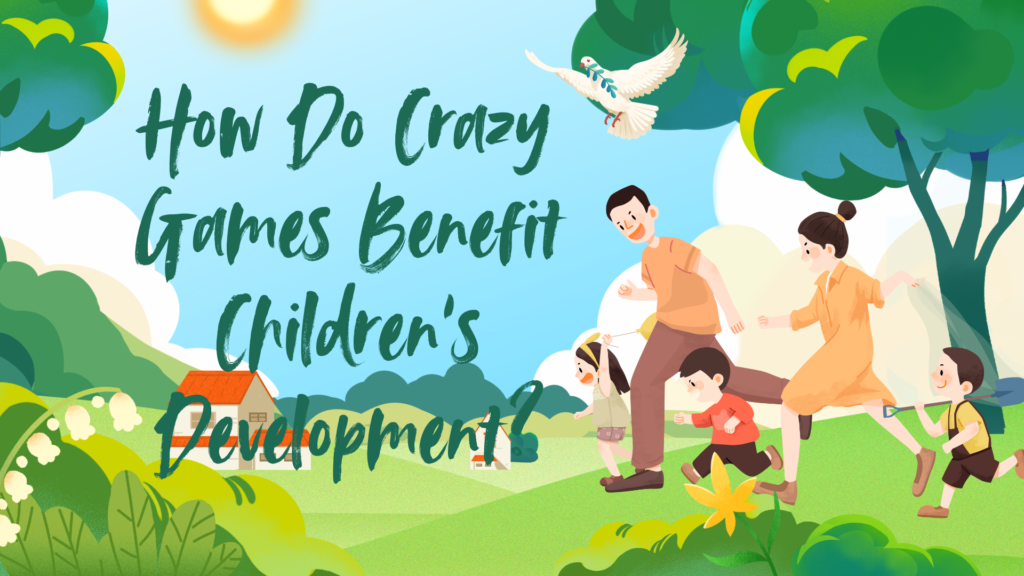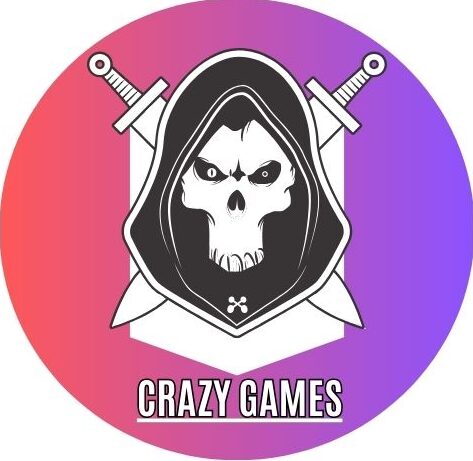Table of Contents
Introduction
The world of today is highly fast-paced. The children have to be entertained with a variety of options that they can opt for. In this regard, “crazy games” have been one of the most sought-after options for kids. By “crazy games,” people generally refer to highly interactive and fun video games, which may be unconventional. Such games entertain the kids and form a part of their development. Earlier, video games were always regarded as having a negative impact on kids, but recent concerns from science have revealed that such frantic games would contribute much to a lot of cognitive developments and socialization in kids if used correctly.

Evolution of Crazy Games
However, before talking about the benefits, it is important to know what “crazy games” are. These games are weird, quick-paced, and chock full of unusual or silly things. It could involve unorthodox mechanics, vivid graphics, or themes that suit the child’s imagination. These can be anything from puzzle games to action-filled adventures or educational simulations. Mobile apps, browser games, or even console-based games-these are now crazily entertaining in children.
Cognitive Development and Problem Solving
Crazy games are those which give maximum cognitive benefits to the children, making them solve their problems better. Most of the games require critical thinking, solving puzzles, or making quick decisions. This will enhance logical reasoning, pattern recognition, and even strategic thinking.
Story from My Experience: I recall, at a young age, playing an odd game in which I had to build some complex structure assisted by avoiding chaotic obstacles at all costs. Silly, of course, but it made me think ahead, plan my moves, and adapt to changes all the time. The more hours I was playing, the better I was at solving problems outside of games, and sometimes even working on a tricky homework assignment or figuring out something that’s going on at school.
This is supported by research. The American Psychological Association has conducted studies indicating that games that involve critical thinking and problem-solving help in the development of cognitive flexibility among children. In making quick decisions and learning to adapt to new environments, children become more skilled at overcoming challenges both in games and in real life.
Increased Creativity and Imagination
Crazy games come with weird situations or magical worlds that challenge kids to be creative a little when trying to attempt things. This will enable them to test new spaces, solve problems in the most unlikely ways possible, or test varied strategies.
Story: I loved to play this game to death because you could create a whole virtual city. There was no goal set up in the game, along with guidelines as to what needed to be constructed from buildings to roads to lands. This gave me the idea of thinking beyond the box, so to say, and challenging my creativity into newer heights. It was all about making something new and completely whole rather than the completion of work.
These are experiences very important for the development of children. According to the University of Toronto, children who engage in imaginative play – which includes playing creative video games – tend to develop better problem-solving skills and higher levels of creativity as they grow older. Such skills help in academics and also in real-world situations, like coming up with innovative solutions at work or in social interactions.
Emotional Regulation and Stress Relief
In spite of the surprise nature and fast pace of nuttier games, they can really help a child learn to control his emotions. Quick games nudge the player to respond fast and usually require the player to handle the failure as well. The ability to come back after a failure and/or a challenge is an important life skill, and games can provide a controlled environment wherein children can practice emotional resilience.
Personal Experience: I could remember racing the game when I was in my teenage days. It is quite challenging and there are a lot of hard levels and times wherein you would keep on losing continuously. But amidst losing, I learned the art of composing one’s self and adjusting one’s strategy to win again and again. The patience and know-how about dealing with frustration gave me a very important lesson in the later stages in school or in the workplace.
The NIH also argues that video games can help educate children on how to manage stress while developing emotional ways of coping with it. Funny or absurd video games can often be a trigger for laughter or joy, hence reducing anxiety, which is something that promotes general emotional well-being.

Social skills and teamwork:
Many crazy games, mostly multiplayer online games, enable children to connect with other people. Such experiences can teach children social skills very fundamental, such as communication, teamwork, and the way to resolve conflicts.
Actual Situation: He told me how his daughter, a completely addicted online role-playing game addict, assembles a team of other young players from around the world. They cooperate by solving challenges together, coordinating with one another through in-game chats, and brainstorming over how to win. Commented that the skills of his daughter to develop the ability to cooperate, share ideas, and lead her team had grown with this process.
Cooperative games, according to research by the Joan Gang Cooney Center, improve children’s team and social communications skills. In most multiplayer games, many people collaborate to obtain the common good of the achievement of the goal. Therefore, such games improve some of the essential interpersonal skills, including listening, group problem-solving, and resource sharing.
Better Motor Skills and Hand-Eye Coordination
There are many silly games, mostly action-based or movement-requirement games that can develop motor skills in a child. The fast reaction games require the person to respond rapidly to stimuli shown on the computer screen, which enhances hand-eye coordination and develops the speed of reaction.
Story: It was really a wild game during my childhood days. I thoroughly enjoyed it as I had to tap the screen in line with the beat of the music. I needed a few moments before I could actually bear with games having a quick pace. As the days went by, I felt my coordination to hit the notes just in time to have picked up very rapidly. It made me feel fulfilled each time it happened.
According to the research conducted, playing action video games develops a human’s visual attention as well as the ability to recognize locations and spatial relations, hand-eye coordination skills, among others. For example, published work in the Nature journal reveals that the children who play action games tend to develop quicker hand-eye coordination skill sets compared to the children who do not play.
Role of Crazy Games in Education
There are numerous educational crazily funny games that combine fun with education, which allow kids to look for an entertaining approach to gain some new piece of information. One might play, among others moths, science, language arts and history etc.
Personal Anecdote: The craziest game based on history I recall playing was wherein I traveled back in time, living through all the greatest events in history. The whimsy of the design in the game along with its twist made history not only interesting but exciting to read rather than getting it in school. It helps me remember a lot of stuff since the game converted abstract knowledge into an experience.
Educational games help to enhance the interest of children towards those subjects in which they might have shown little or no interest otherwise. Such games keep the children actively engaged with what is being taught and hence help learn things better. According to one such study, it has been seen that the children who play educational games do well in the standardized tests in comparison to the ones who don’t. Journal of Educational Psychology.

FAQs Regarding Crazy Games and Child Development
1. Is playing crazy games healthy for kids?
Absolutely. Playing crazy games may bring along various positive changes to children such as improving their cognitive abilities, enhancing creativity, regulation of emotions, and developing social interaction skills. Moderation should be employed not to undermine the rest of their developmental processes such as exercise and direct interpersonal communication.
2. For how long can wild games be played by children?
A child should spend no more than one to two hours per day playing screen-based activities. So, it must be balanced between games and playing physical activities or schoolwork with socialization.
3. Can weird games enhance the academic performance of a child?
Yes, some weird games can improve academics if they have some educational and intellectual appeal in them as such that subjects of learning become an entertaining subject and can build problem-solving skills along with critical thinking ability, that a child needs.
4. Do lunatic games also have some detriments?
Crazy gaming or playing games often may cause sleep problems, low workout activity, as well as potential impacts on your child’s mental issues. Parents and caregivers should screen what the kid plays and its length to retain a healthy gaming regime for their offspring.
5. How can parents select the appropriate crazy games for their children?
When selecting games, parents should look for age-appropriate content, educational value, and positive messages. Games that encourage creativity, problem-solving, and social interaction are ideal. In addition, parents should ensure that games do not contain excessive violence or inappropriate content.
Conclusion
Crazy games, when used wisely, can be powerful tools for children’s development. They help in developing better thinking abilities, creativity, emotional intelligence, social competencies, and motor skills as well. Thus, if these effects are understood, they would combine it well in a schedule such that there could be benefits seen through games’ utilization by their parents in ensuring proper development by the child. So the next time your child gets into that weird or funny game, just take a sigh-it may actually be teaching them important things that can aid them in some other field.

